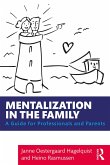The book explains the core concepts of mentalization, an idea whereby an appreciation of internal mental states, both those of others and oneself, can lead to an understanding of overt behaviour. It explores key ideas central to this - such as attachment style, internal regulation, emotional compass, and parental navigation - but also offers practical guidance around issues such as play, siblings, boundaries, and sexuality.
Accessibly written throughout and featuring pedagogical tools that bring the theory into life, this wide-ranging book will be essential reading for a range of professionals, from those working with foster families to teachers working with troubled or disruptive children. It also offers a way for parents to better understand themselves, their own parenting style, and the dynamics which make up family life.
Dieser Download kann aus rechtlichen Gründen nur mit Rechnungsadresse in A, B, BG, CY, CZ, D, DK, EW, E, FIN, F, GR, HR, H, IRL, I, LT, L, LR, M, NL, PL, P, R, S, SLO, SK ausgeliefert werden.
"The authors use the mentalizing framework expertly to articulate for parents an understanding of child development that provides a basis for practical help in parenting. They have organized their presentation with crystal clarity while providing an abundance of everyday examples of parenting challenges accompanied by useful suggestions and strategies. Most importantly, they give primary weight to the quality of relationships among family members, grounded in sensitive and skillful mentalizing that the authors exemplify." Jon G. Allen, PhD, Professor of Psychiatry in the Menninger Department of Psychiatry and Behavioral Sciences at the Baylor College of Medicine; and Senior Staff Psychologist in The Menninger Clinic, Houston, Texas
"In this new volume, Janne Østergaard Hagelquist and Heino Rasmussen provide a sensitive and reflective guide for parents and families who wish to increase their mentalizing capacity. With humor and humility (two important characteristics of the mentalizing stance), and rich and vivid examples, the authors manage to gently convey not only the "what", but also the "how" of mentalizing. All parents and families can benefit from reading this book, and the volume also presents a very useful tool for psychoeducation that clinicians may use in their work with families." Carla Sharp, PhD, Director of Clinical Training and the Developmental Psychopathology Lab at Houston University, Texas









